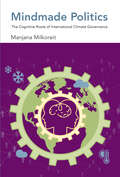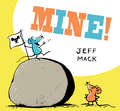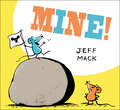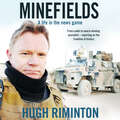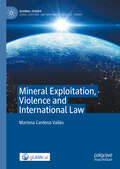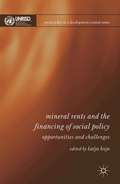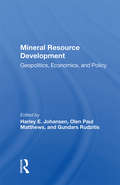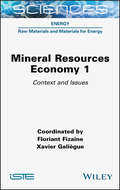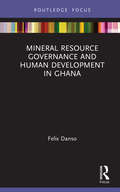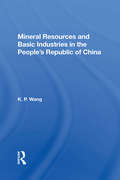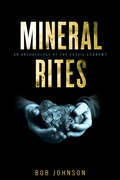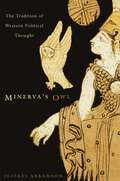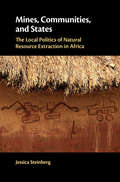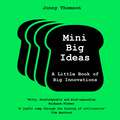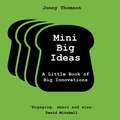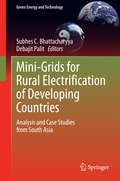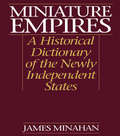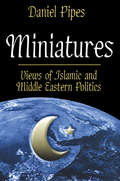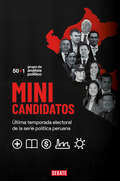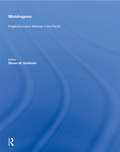- Table View
- List View
Mindmade Politics: The Cognitive Roots of International Climate Governance (The\mit Press Ser.)
by Manjana MilkoreitHow integrating cognitive theories and international relations scholarship can yield valuable insights into the effectiveness of climate negotiations.Mindmade Politics takes a novel, interdisciplinary approach to understanding the complex and contentious dynamics of global climate politics. Manjana Milkoreit argues that integrating cognitive theories and international relations scholarship can yield valuable insights into multilateral cooperation (or the lack of it) on climate change and the process of negotiating climate agreements. Milkoreit argues that cognition is at the root of all political behavior and decision making. Some of the most important variables of international relations scholarship—the motivations of political actors—are essentially cognitive variables. Drawing on interviews with participants in the United Nations Framework Convention on Climate Change (UNFCCC), Milkoreit examines the thoughts, beliefs, and emotions of individuals and groups, focusing on the mental mechanisms connecting decision-relevant factors and observed political behavior. Milkoreit offers a brief introduction to international relations theory and key insights regarding the politics of climate change; outlines the basic cognitive theories and concepts that she applies in her analysis, discussing the cognitive challenges of climate change; and describes the integrated methodological approach she used for her cognitive-political analysis. She presents four cognitive-affective lessons for global change politics, including the “cognitive triangle” of three major concerns of climate negotiators—threat, identity, and justice—and she identifies six major belief systems driving negotiators. Finally, she offers guidance for climate governance based on her findings. Utilizing recent advances in cognitive science, Milkoreit builds a theoretical bridge between two major disciplines that will benefit both scholars and practitioners.
Mindy Kim, Class President (Mindy Kim #4)
by Lyla LeeFresh Off the Boat meets Junie B. Jones in the adorable chapter book series following Mindy Kim, a young Asian American Girl—in this fourth novel, Mindy runs for class president!It&’s time to pick a class president, and Mindy really wants to win—and she&’s basing her entire campaign on snacks and being kind, so how could she NOT be chosen? But there is one big thing that Mindy is not sure she can do—make a speech to her class about why she would be the best pick for president. Can Mindy face her fears and show the class—and herself—that she can be the best class president ever?
Mine!
by Jeff MackStart with one rock. Add two mice. The end result? A never-ending battle! Or is it? Using only one word, along with many brightly colored and lively illustrations, Jeff Mack brings his hallmark humor to this rollicking book that will have readers of every age reconsidering whether "Mine!" is the best answer.
Mine!: (read Aloud Books For Kids, Funny Children's Books)
by Jeff MackStart with one rock. Add two mice. The end result? A never-ending battle! Or is it? Using only one word, along with many brightly colored and lively illustrations, Jeff Mack brings his hallmark humor to this rollicking book that will have readers of every age reconsidering whether "Mine!" is the best answer.
Minefields: A life in the news game - the bestselling memoir of Australia's legendary foreign correspondent
by Hugh RimintonMinefields is a compelling exploration of a foreign correspondent's life - proof of Hugh's belief that 'if you go looking for trouble, you'll probably find it'.Over nearly forty years as a journalist and foreign correspondent, Hugh Riminton has been shot at, blown up, threatened with deportation and thrown in jail. He has reported from nearly fifty countries, witnessed massacres in Africa, wars and conflicts on four continents, and every kind of natural disaster.It has been an extraordinary life. From a small-town teenager with a drinking problem, cleaning rat cages for a living, to a multi-award-winning international journalist reporting to an audience of 300 million people, Hugh has been a frontline witness to our times. From genocide in Africa to the Indian Ocean tsunami, from wars in Iraq and Afghanistan to slave-buying in Sudan, Hugh has seen the best and worst of human behaviour. In Australia, he has covered political dramas, witnessed the Port Arthur massacre and the Thredbo disaster and broken a major national scandal. His work helped force half a dozen government inquiries. His story is entertaining, deeply personal and quietly wise.'An impressive career. His story is a triumph of substance over style.' Sydney Morning Herald'Hugh is an icon of Australian journalism' Michael Ware, former Iraq correspondent for TIME and CNN
Mineral Exploitation, Violence and International Law (Global Issues)
by Mariona Cardona VallèsThis book explores the challenges that international law faces in curtailing human rights violations arising from mineral exploitation. Beginning with the specific dynamics between mineral exploitation and human rights abuses, the analysis progressively uncovers the layers of regulatory challenges, focusing on the complexities of how economic regimes intersect with, and often undermine, human rights protections. This perspective shows how the fragmentation of international law is not only affecting the capability to protect global interests but also threatening the systemic operation of international law. In this regard, this work presents three expressions of how the fragmentation of international law impacts the response to violence in mineral exploitation. First, fragmentation influences legal operators' classification and objective setting for situations; second, it shapes the selection of response tools, limited by these objectives; and third, it creates conflicts in applying international obligations pertaining to distant special regimes, where the interpretations rendered by decisionmakers are inherently biased towards the interests of the special regime to which they pertain.
Mineral Rents and the Financing of Social Policy
by Katja HujoAn exploration of the implications of mineral-led wealth and the opportunities that this creates for economic and social development. The book includes theoretical and policy analyses as well as micro level country case studies, including Norway, Chile, Indonesia, Nigeria and Botswana.
Mineral Resource Development: Geopolitics, Economics, And Policy
by Harley E JohansenOne of the most significant resource-development and industrial-policy issues facing the United States today is the continued decline of domestic production and processing of metallic minerals and the associated dependence on foreign supplies for our needs. Domestic mining and processing industries have suffered from various economic problems and i
Mineral Resource Economics 1
by Florian Fizaine Xavier GaliegueThe constant increase in the consumption of mineral resources, as well as the growing awareness of their exploitation, is causing deep concern within the scientific community. This concern is justified by the fact that the energy transition will increase the pressure on these resources, as renewable energies require an increased and more diversified quantity of mineral materials.This book presents an overview of the exploitation of these mineral resources, where the natural, regulatory and environmental constraints interfere with economic, financial and geopolitical interests. By mobilizing the fields of the humanities, geosciences and engineering, it also analyzes the challenges that the energy transition will encounter, challenges related to the contradictory effects that the acceleration of the extraction of these resources will have on their physical availability, the economies that exploit them and the populations that live off of them
Mineral Resource Governance and Human Development in Ghana (Routledge Studies in African Development)
by Felix DansoThis book investigates how mineral resources can be governed to promote people-centred development in Ghana, focusing on the three main human development variables: living standards, education and health. Ghana is endowed with abundant mineral resources. The mineral sector accounts for about 14% of total tax revenue, driven mostly by an increase in export earnings from the gold sector and the commencement of crude oil exports. However, the country has not yet been able to use its natural resources to promote human development, and the majority of the population still lives on less than $2 a day. This book argues for a paradigm shift in the discussion of mineral resources, one that looks to govern natural resources in such a way as to improve standards of living, health, education, income levels, empowerment, quality of work and threats from violence. The human-centred mineral resource governance approach developed by this book will not only be useful to Ghana, but can also be applied to other mineral-rich countries in sub-Saharan Africa. This book will be important to upper-level students and researchers of natural resource management, international development and African studies, as well as to NGOs, practitioners and policymakers who recognise the importance of linking natural resources income to human development.
Mineral Resources and Basic Industries in the People's Republic of China
by K.P. WangFirst published in 1977. Mining and metallurgy have had a long history in China, and resources there have always been considered promising. More recently, in the People's Republic of China (PRC), a remarkable industrial renaissance is underway that should gain further momentum in the years ahead. Rapid development of minerals has brought the PRC prominence not only in the area of industrialization, but also in world affairs. Chinese mineral developments, especially in petroleum, have been increasingly in the news. A very large coal industry is already in existence. The steel industry ranks fifth or sixth in the world. The PRC is also prominent in fertilizer, cement, and salt production, and its export metals are well known. The need to know about Chinese mineral developments and the intense interest in them have prompted Dr. Wang's study. Emphasizing the world significance of Chinese minerals, he reviews the history of growth in the PRC' s mineral industry and its present supply position; evaluates policy considerations and regional technical factors affecting mineral development; and assesses the PRC's mineral trade and its efforts to obtain equipment, supplies, and new technology.
Mineral Rites: An Archaeology of the Fossil Economy (Energy Humanities)
by Bob JohnsonAn archaeology of Western energy culture that demystifies the role that fossil fuels play in the day-to-day rituals of modern life.Spanning the past two hundred years, this book offers an alternative history of modernity that restores to fossil fuels their central role in the growth of capitalism and modernity itself, including the emotional attachments and real injuries that they generate and command. Everything about us—our bodies, minds, sense of self, nature, reason, and faith—has been conditioned by a global infrastructure of carbon flows that saturates our habits, thoughts, and practices. And it is that deep energy infrastructure that provides material for the imagination and senses and even shapes our expectations about what it means to be fully human in the twenty-first century. In Mineral Rites, Bob Johnson illustrates that fossil fuels are embodied today not only in the morning commute and in home HVAC systems but in the everyday textures, rituals, architecture, and artifacts of modern life. In a series of illuminating essays touching on such disparate topics as hot yoga, electric robots, automobility, the RMS Titanic, reality TV, and the modern novel, Johnson takes the discussion of fossil fuels and their role in climate change far beyond the traditional domains of policy and economics into the deepest layers of the body, ideology, and psyche. An audacious revision to the history of modernity, Mineral Rites shows how fossil fuels operate at the level of infrapolitics and how they permeate life as second nature.
Minerva's Owl: The Tradition of Western Political Thought
by Jeffrey B AbramsonAs Hegel famously noted, referring to the Roman goddess Minerva, her owl brought back wisdom only at dusk, when it was too late to shine light on actual politics. Jeffrey Abramson provides a lively and accessible guide for readers discovering the tradition of political thought that dates back to Socrates and Plato, with contemporary examples that illustrate the enduring nature of political dilemmas.
Mines, Communities, and States: The Local Politics of Natural Resource Extraction in Africa
by Jessica SteinbergWhen do local communities benefit from natural resource extraction? In some regions of natural resource extraction, firms provide goods and services to local communities, but in others, protest may occur, leading to government regulatory or repressive intervention. Mines, Communities, and States explores these outcomes in Africa, where natural resource extraction is a particularly important source of revenue for states with otherwise limited capacity. Blending a mixture of methodological approaches, including formal modelling, structured case comparison, and quantitative geo-spatial empirical analysis, it argues that local populations are important actors in extractive regions because they have the potential to impose political and economic costs on the state as well as the extractive firm. Jessica Steinberg argues that governments, in turn, must assess the economic benefits of extraction and the value of political support in the region, and make a calculation about how to manage trade-offs that might arise between these alternatives.
Ming China and Vietnam: Negotiating Borders in Early Modern Asia (Studies of the Weatherhead East Asian Institute, Columbia University)
by Kathlene BaldanzaStudies of Sino-Viet relations have traditionally focused on Chinese aggression and Vietnamese resistance, or have assumed out-of-date ideas about Sinicization and the tributary system. They have limited themselves to national historical traditions, doing little to reach beyond the border. Ming China and Vietnam, by contrast, relies on sources and viewpoints from both sides of the border, for a truly transnational history of Sino-Viet relations. Kathlene Baldanza offers a detailed examination of geopolitical and cultural relations between Ming China (1368–1644) and Dai Viet, the state that would go on to become Vietnam. She highlights the internal debates and external alliances that characterized their diplomatic and military relations in the pre-modern period, showing especially that Vietnamese patronage of East Asian classical culture posed an ideological threat to Chinese states. Baldanza presents an analysis of seven linked biographies of Chinese and Vietnamese border-crossers whose lives illustrate the entangled histories of those countries. Offers new insights into the functioning of early modern inter-state relations in Asia. Counters nationalist narratives of the history of Vietnam, appealing to scholars of both Chinese and Vietnamese history. Draws attention to under-utilized historical sources, including poetry and visual images, to tell a multi-perspectival history.
Minha Viagem pelo Ocidente (autobiografia)
by Gabriel Martimiano Pires Wael El-ManzalawyEu estava muito interessado em política e notícias e o resultado foi que eu senti que todos os povos ocidentais nos odeiam, embora a generalização seja um erro muito comum, eu era a vítima deste erro: ouvia a notícia e eu generalizava meus sentimentos: todos os povos ocidentais nos odeiam e querem destruir nossos países. Desde 2003, eu comecei a usar a Internet. Eu lidei com muitas pessoas ocidentais e, aos poucos, mudei meus sentimentos. Convido-os a ler este livro e descobrir minha viagem pelo mundo ocidental.
Mini Big Ideas: A Little Book of Big Innovations
by Jonny Thomson'Witty, knowledgeable and mind-expanding' RICHARD FISHER | 'A joyful romp' TOM HARFORD | 'A fun and inspiring teaser for curious minds' JÉRÉMIE HARRISEvery so often, a new idea comes along that changes everything. Vaccinations. Relativity. Fascism. Can we imagine a world before the invention of writing? What would Christianity have looked like without with a concept of hell? Sometimes these ideas come along suddenly: Copernicus suggesting the earth revolves around the sun; Gutenberg's printing press, Darwin's theory of evolution. Sometimes they evolve over generations: the institution of marriage; the development of animal husbandry; the understanding of genetics. Either way, once the idea gains a foothold, nothing is the same again.This fascinating little book tells the stories behind 150 revolutionary concepts and explains why they are important. Taken from the realms of science, politics, society, religion and technology, these are the big ideas that have changed the world - in a nutshell.
Mini Big Ideas: A Little Book of Big Innovations
by Jonny Thomson'Witty, knowledgeable and mind-expanding' RICHARD FISHER | 'A joyful romp' TOM HARFORD | 'A fun and inspiring teaser for curious minds' JÉRÉMIE HARRISEvery so often, a new idea comes along that changes everything. Vaccinations. Relativity. Fascism. Can we imagine a world before the invention of writing? What would Christianity have looked like without with a concept of hell? Sometimes these ideas come along suddenly: Copernicus suggesting the earth revolves around the sun; Gutenberg's printing press, Darwin's theory of evolution. Sometimes they evolve over generations: the institution of marriage; the development of animal husbandry; the understanding of genetics. Either way, once the idea gains a foothold, nothing is the same again.This fascinating little book tells the stories behind 150 revolutionary concepts and explains why they are important. Taken from the realms of science, politics, society, religion and technology, these are the big ideas that have changed the world - in a nutshell.
Mini Big Ideas: A Little Book of Big Innovations
by Jonny ThomsonFrom the internationally acclaimed author of MINI PHILOSOPHY, here are 150 big ideas in bite-sized chunks.Every so often, a new idea comes along that changes everything. Vaccinations. Relativity. Fascism. Can we imagine a world before the invention of writing? What would Christianity have looked like without with a concept of hell? Sometimes these ideas come along suddenly: Copernicus suggesting the earth revolves around the sun; Gutenberg's printing press, Darwin's theory of evolution. Sometimes they evolve over generations: the institution of marriage; the development of animal husbandry; the understanding of genetics. Either way, once the idea gains a foothold, nothing is the same again.This fascinating little audiobook tells the stories behind 150 revolutionary concepts and explains why they are important. Taken from the realms of science, politics, society, religion and technology, these are the big ideas that have changed the world - in a nutshell.(P) 2023 Headline Publishing Group Ltd
Mini-Grids for Rural Electrification of Developing Countries
by Subhes C. Bhattacharyya Debajit PalitIn recognition of the fact that billions of people in the developing world do not have access to clean energies, the United Nations launched the Sustainable Energy for All Initiative to achieve universal energy access by 2030. Although electricity grid extension remains the most prevalent way of providing access, it is now recognized that the central grid is unlikely to reach many remote areas in the near future. At the same time, individual solutions like solar home systems tend to provide very limited services to consumers. Mini-grids offer an alternative by combining the benefits of a grid-based solution with the potential for harnessing renewable energies at the local level. The purpose of this book is to provide in-depth coverage of the use of mini-grids for rural electrification in developing countries, taking into account the technical, economic, environmental and governance dimensions and presenting case studies from South Asia. This book reports on research carried out by a consortium of British and Indian researchers on off-grid electrification in South Asia. It provides state-of-the art technical knowledge on mini-grids and micro-grids including renewable energy integration (or green mini-grids), smart systems for integration with the central grid, and standardization of systems. It also presents essential analytical frameworks and approaches that can be used to analyze the mini-grids comprehensively including their techno-economic aspects, financial viability and regulatory issues. The case studies drawn from South Asia demonstrate the application of the framework and showcase various successful efforts to promote mini-grids in the region. It also reports on the design and implementation of a demonstration project carried out by the team in a cluster of villages in Odisha (India). The book's multi-disciplinary approach facilitates understanding of the relevant practical dimensions of mini-grid systems, such as demand creation (through interventions in livelihood generation and value chain development), financing, regulation, and smart system design. Its state-of-the art knowledge, integrated methodological framework, simulation exercises and real-life case analysis will allow the reader to analyze and appreciate the mini-grid-related activities in their entirety. The book will be of interest to researchers, graduate students, practitioners and policy makers working in the area of rural electrification in developing countries.
Miniature Empires: A Historical Dictionary of the Newly Independent States
by James MinahanThe 20th century's most protracted conflict, the Cold War, also provided the longest and most stable peace in the history of the modern world--a fragile peace that came at the price of national freedom for many people. With the demise of the Cold War, new nearly-unknown countries, long ignored or suppressed, came to the attention of the world, as ethnic and national conflicts, rooted in the multi-ethnic populations of the newly independent states, emerged. From Bosnia-Herzegovina and Macedonia to Eritrea and Uzbekistan, Miniature Empires provides an essential guide to the states recognized since 1989 and the "nations" that dwell within their borders. Miniature Empires is the first reference book to address the post-Cold War nationalist resurgence by focusing on the nations within the new nation-states--both the core nationalities and the national minorities. Each article highlights the historical, political, social, and economic evolution of the new nations. Outstanding Academic Book
Miniatures: Views of Islamic and Middle Eastern Politics
by Daniel PipesThe volatility of Muslim and Middle Eastern politics has made these interrelated topics an overriding preoccupation of world and especially U.S. politics. Perhaps no region of the world has ever so dominated the American public discourse as the Middle East does today. As Daniel Pipes shows, this results mainly, but not exclusively, from the attacks of September 11, 2001 and the ensuing war on terrorism. Other sources of trouble include militant Islam, Muslims in the West, the Arab-Israeli conflict, the Iraq situation, relations with Saudi Arabia, the price of oil and gas, and U.S. policy toward all these issues. These are the central themes of the roughly one hundred essays in Daniel Pipes' Miniatures: Views of Islamic and Middle Eastern Politics.As Pipes notes, the Islamist war against America preceded the events of 9/11. Nevertheless, response to the earlier attacks had been inconsistent and somewhat nonchalant. Pipes shows how the State Department's annual report on Patterns of Global Terrorism veers into unreliability and even falsehood. He explains the problem in George W. Bush trying to decide what is true Islam and what not, in U.S. academics hiding the true meaning of the word "jihad," and in seventh-grade textbooks proselytizing for Islam. Pipes demonstrates that many seemingly devout Islamists are in fact impious frauds. When it comes to the Arab-Israeli conflict, Pipes indicates how the failure of the Oslo process could be discerned as early as 1994 and he shows how Yasir Arafat speaks one way to Arabs and another way to Israelis.This important collection, by one of the foremost experts in the field, presents original insights, accessibly written for Middle East specialists, political scientists, policymakers, journalists, and the interested public.
Minicandidatos: Última temporada electoral de la serie política peruana
by 50+1 Grupo de Análisis PolíticoEn este libro, usted tendrá la oportunidad de conocer en profundidad todas las opciones para elegir al «mal menor» de ocasión. La última temporada de la política peruana nos lleva a una realidad fragmentaria. En la historia quebrantada de la campaña electoral del 2021 no hay roles protagónicos ni estrellas; todos son personajes secundarios en busca de un elector. Ni siquiera quien alcance el triunfo abandonará su esencia de minicandidato, de actor de reparto de la historia peruana favorecido por la compasión del elector-guionista. 50+1 Grupo de Análisis Político presenta 10 perfiles que combinan la crónica periodística y el análisis político sobre las principales candidaturas a la Presidencia de la República 2021. Carlos Meléndez, destacado politólogo peruano, edita este volumen compuesto por los textos de Javier Albán, Jair Almendras, Flavia Arana Cisneros, Jonathan Castro, Macarena Costa Checa, Ariana Lira, José Carlos Paredes, José Carlos Requena y Valerie Vásquez de Velasco quienes nos recuerdan que los minicandidatos no devolvieron la fe a los electores. En este libro, usted tendrá la oportunidad de conocer en profundidad todas las opciones para elegir al «mal menor» de ocasión.
Minidragons: Fragile Economic Miracles In The Pacific
by Steven M. GoldsteinThe purpose of this book is to introduce one of the most significant international developments of the post World War II era-the dramatic socio-economic transformation achieved by Hong Kong, Singapore, South Korea and Taiwan. In less than three decades, these "minidragons" of Asia have become major economic players, not only in the economy of the Pacific rim, but in the global economic system as well. In the essays which follow, the nature of this transformation is charted; its causes are described; and some assessment is made of the factors that will shape the future of these "fragile economic miracles." This volume was originally conceived as a companion to the television series entitled Minidragons, an international co-production of Maryland Public Television (MPT) with NHK, Japan, and Film Australia.
Minilateralism
by Chris BrummerEconomic diplomacy is changing. The multilateral organizations that dominated the last half of the twentieth century no longer monopolize economic affairs. Instead, countries are resorting to more modest 'minilateral' strategies like trade alliances, informal 'soft law' agreements, and financial engineering to manage the global economy. Like traditional modes of economic statecraft, these tools are aimed at both liberalizing and supervising international financial policy in a world of diverse national interests. But unlike before, they are specifically tailored to navigating a post-American (and post-Western) world where economic power is more diffuse than ever before. This book explains how these strategies work and reveals how this new diplomatic toolbox will reshape how countries do business with one another for decades to come.
